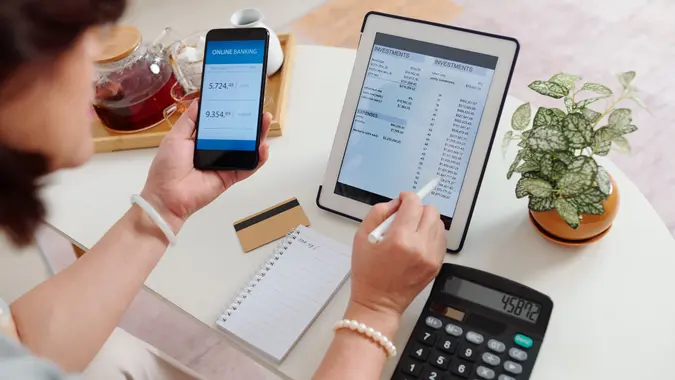How Many Bank Accounts Should I Have?

Commitment to Our Readers
GOBankingRates' editorial team is committed to bringing you unbiased reviews and information. We use data-driven methodologies to evaluate financial products and services - our reviews and ratings are not influenced by advertisers. You can read more about our editorial guidelines and our products and services review methodology.

20 Years
Helping You Live Richer

Reviewed
by Experts

Trusted by
Millions of Readers
You can have as many bank or credit union accounts as you want, with very few exceptions. That means it’s up to you to determine just how many accounts you should have. One? Three? Five? More? The answer depends on your financial goals.
Here’s what to consider when choosing how many bank accounts to open.
How Many Bank Accounts Should I Have?
Most people benefit from having at least two bank accounts — a checking and a savings account — but you may need more depending on your goals.
For budgeting, separating expenses or saving for different goals, three to five accounts may be ideal.
Why Have Multiple Bank Accounts?
Different types of bank accounts serve different purposes. Trying to run your entire financial life through a single bank account can get confusing.
While it might feel like overkill to have multiple checking or savings accounts, it can actually make handling your monthly finances easier.
Budgeting
Most people use a checking account or checkless spending account to pay bills and cover day-to-day expenses. Although you can do that with a single account, using two separate accounts can make it easier to budget your money.
- You might dedicate one account to necessary expenses — mortgage or rent, utilities, transportation, insurance and groceries. This account could be the first one you fund when you get paid.
- Keeping money for non-essentials in a separate account is a good way to prevent overspending. This could leave you short when it comes time to pay an essential bill.
Savings Accounts for Different Goals
Splitting your savings into separate accounts for specific goals can help you stay focused and reach your top priorities faster.
Pro Tip
Trying to build an emergency fund, save for a vacation and plan for a home purchase all at once? Open a separate savings account for each goal. This makes it easier to track your progress — and prioritize where your money goes first.
Maximize Interest
If you’re keeping all of your money in a local bank, you could be missing out on a lot of interest. Online banks like Marcus and Ally offer high-yield savings accounts that pay over 3% interest.
If you have savings you won’t need right away, putting it in a high-interest account can help you earn more without switching banks completely.
Cash Bonuses
Some banks offer bonuses for opening new accounts. For example, Chase gives new checking customers $300 for setting up $500 in direct deposits within 90 days.
If you have multiple income sources, you could qualify for similar offers at different banks at the same time.
Business Accounts
It’s important to keep your personal and business finances separate for tax and legal reasons. A separate business account is also essential for accurately tracking revenue and expenses.
Bank Accounts at a Glance
Use this quick comparison to decide which accounts match your goals — and whether opening another one makes sense.
| Account Type | Purpose | Good For |
|---|---|---|
| Checking Account | Daily spending, bills | Everyone |
| Emergency Savings | Unexpected expenses | Everyone |
| Goal-Based Savings | Vacations, down payments, etc. | Savers with multiple goals |
| Business Checking | Business income and expenses | Freelancers, small business owners |
Drawbacks of Managing Multiple Accounts
While assigning different purposes to separate bank accounts can help you stay organized, having too many accounts might backfire. Here are some of the most common issues:
- Monthly fees can add up: Some accounts charge maintenance fees unless you meet balance or deposit requirements — which can be harder to manage across multiple accounts.
- Inactivity fees are possible: If you stop using an account, your bank might charge a dormancy fee. For example, Citizens Bank charges a $5 monthly fee for inactive accounts.
- More accounts means more to manage: Keeping track of all your accounts increases the chance of mistakes or losing track of your money.
How To Determine How Many Bank Accounts to Have
There’s no perfect number — figuring out how many bank accounts you should have depends on your income, savings strategy and personal preferences.
Here are a few things to consider:
- Savings goals. If you have many savings goals, consider whether having multiple savings accounts can help you track your progress.
- Spending needs. Having multiple bank accounts can help you stay organized with your spending. For example, you might use one account just for bills and another for daily expenses. You could also have a shared account with your partner for household expenses and separate accounts for your personal spending.
- Business income. If you run a business or have a side gig, it’s always a good idea to have an account that’s separate from your personal account. It’ll keep your accounting cleaner and avoid potential liability.
- Budget tracking. Having multiple accounts can actually make it easier to stay on budget, but only if you’re committed to careful management of the accounts.
4 Tips for Managing Multiple Bank Accounts
Keeping track of several accounts takes some effort, especially if you want to avoid extra fees. Some banks will charge a monthly service charge, for example, if your balance dips below a certain amount. Others might require a monthly direct deposit, or even just a single deposit, to waive service charges.
Tip 1: Set Up Automatic Transfers
To avoid monthly fees that can cost $10 or more, set up automatic transfers from your checking to your savings account. This way, you don’t have to worry about remembering to move the money yourself.
Tip 2: Use Different Banks
If you have multiple accounts, especially with large balances, consider opening accounts at different banks to protect your assets.
Keep In Mind
The Federal Deposit Insurance Corp. provides insurance of $250,000 per depositor, per insured bank, for each ownership category. So, if you have two savings accounts that each exceed that limit, you’ll want to keep the money in different banks.
Tip 3: Use Financial Management Apps
Use budgeting apps to connect all of your bank accounts and allow you to see every transaction and account balance in one place.
Apps like Monarch Money or You Need a Budget offer automatic syncing of your transactions. They even allow you to set goals attached to each account.
Tip 4: Regularly Review and Rebalance
You’ll want to evaluate your bank account setup on a regular basis and ensure it’s working smoothly. You might find that you don’t need as many accounts and can close a few.
You might also find that you need to expand the number of accounts you have for easier management.
Security Tips for Managing Multiple Accounts
The more bank accounts you have, the more important it is to protect your financial information. Each new login adds another point of vulnerability, so staying secure isn’t just smart, it’s essential.
- Use a password manager. Instead of recycling passwords or struggling to remember them, use a reputable password manager to create and store strong, unique passwords for each bank account. This reduces the risk of one data breach compromising multiple accounts.
- Enable two-factor authentication. Most banks offer two-factor authentication (2FA), which adds a layer of security by requiring a second form of verification, like a text or app notification, before you can log in.
- Set up real-time alerts. Activating transaction alerts helps you spot suspicious activity right away. You’ll know immediately if a charge hits an account you weren’t expecting to use.
- Keep your contact info up to date. If your bank needs to verify a login or alert you to fraud, having an outdated phone number or email address can slow down your response or block access entirely.
Managing multiple accounts is convenient, but it also requires staying a step ahead of cyber threats. With a few simple precautions, you can enjoy the benefits without exposing yourself to unnecessary risk.
The Bottom Line
The right number of bank accounts for your wallet varies based on your money management strategies.
- If you want separation between money goals, then you’ll want more accounts.
- If you are more comfortable keeping your funds in one place, you might opt for a single savings account and checking account.
As you move forward, watch for fees and be willing to make adjustments along the way.
FAQ
You have questions about opening multiple bank accounts. Here are the answers.- Is there a limit to the number of accounts you can open at one bank?
- There's no legal limit, but bank policies might limit how many accounts you can have. However, GOBankingRates' survey of major banks didn't find any that impose a limit.
- Does having multiple accounts impact your credit score?
- No. Banks don't report account information to credit bureaus, your accounts don't appear on your credit reports, and they have no impact on your score.
- What are the best types of accounts to combine for financial management?
- Checking accounts: They are designed for accepting deposits, paying bills, getting cash from and handling daily spending needs.
- High-yield savings accounts: These accounts pay competitive interest rates on money you set aside money for larger money goals.
- Money market accounts: Money market accounts are a type of hybrid bank account. They offer higher interest rates than most savings accounts and also come with a debit card and check-writing privileges.
- Cash management accounts: Offered by brokers, these accounts are a place to hold cash that you plan on investing. Many cash accounts now offer full checking account features and pay interest as high as other high-yield accounts, making them a great place to stash excess cash.
- Certificates of deposit: A type of time deposit account that pays high interest rates for locking up your cash for a set amount of time. You can choose your term length and fund the account -- earning upwards of 5% interest on your deposits.
Sarah Sharkey, Jacob Wade, David Navarro and Jami Farkas contributed to the reporting for this article.
Our in-house research team and on-site financial experts work together to create content that’s accurate, impartial, and up to date. We fact-check every single statistic, quote and fact using trusted primary resources to make sure the information we provide is correct. You can learn more about GOBankingRates’ processes and standards in our editorial policy.
- Deposit Accounts by Lending Tree. "Deposit Accounts: Bank Account Rates."
- SoFi. "How Much of Your Paycheck Should You Save?"
- Federal Deposit Insurance Corporation. "Deposit Insurance At A Glance."
- Ally. 2022. "Buckets and boosters: Smart resources to help you save."
 Written by
Written by  Edited by
Edited by 

























